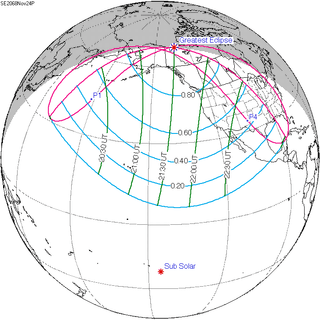Solar eclipse of September 12, 2072
| Solar eclipse of September 12, 2072 | |
|---|---|
 Map | |
| Type of eclipse | |
| Nature | Total |
| Gamma | 0.9655 |
| Magnitude | 1.0558 |
| Maximum eclipse | |
| Duration | 193 sec (3 m 13 s) |
| Coordinates | 69°48′N 102°00′E / 69.8°N 102°E |
| Max. width of band | 732 km (455 mi) |
| Times (UTC) | |
| Greatest eclipse | 8:59:20 |
| References | |
| Saros | 155 (9 of 71) |
| Catalog # (SE5000) | 9670 |
A total solar eclipse will occur on September 12, 2072. A solar eclipse occurs when the Moon passes between Earth and the Sun, thereby totally or partly obscuring the image of the Sun for a viewer on Earth. A total solar eclipse occurs when the Moon's apparent diameter is larger than the Sun's, blocking all direct sunlight, turning day into darkness. Totality occurs in a narrow path across Earth's surface, with the partial solar eclipse visible over a surrounding region thousands of kilometres wide.
Related eclipses
Solar eclipses 2069-2072
Each member in a semester series of solar eclipses repeats approximately every 177 days and 4 hours (a semester) at alternating nodes of the Moon's orbit.
| 120 | April 21, 2069 Partial |
125 | October 15, 2069 Partial |
| 130 | April 11, 2070 Total |
135 | October 4, 2070 Annular |
| 140 | March 31, 2071 Annular |
145 | September 23, 2071 Total |
| 150 | March 19, 2072 Partial |
155 | September 12, 2072 Total |
Metonic series
The metonic series repeats eclipses every 19 years (6939.69 days), lasting about 5 cycles. Eclipses occur in nearly the same calendar date. In addition the octon subseries repeats 1/5 of that or every 3.8 years (1387.94 days).
| 21 eclipse events, progressing from north to south between July 1, 2000 and July 1, 2076 | ||||
|---|---|---|---|---|
| July 1-2 | April 19-20 | February 5-7 | November 24-25 | September 12-13 |
| 117 | 119 | 121 | 123 | 125 |
 July 1, 2000 |
 April 19, 2004 |
 February 7, 2008 |
 November 25, 2011 |
 September 13, 2015 |
| 127 | 129 | 131 | 133 | 135 |
 July 2, 2019 |
 April 20, 2023 |
 February 6, 2027 |
 November 25, 2030 |
 September 12, 2034 |
| 137 | 139 | 141 | 143 | 145 |
 July 2, 2038 |
 April 20, 2042 |
 February 5, 2046 |
 November 25, 2049 |
 September 12, 2053 |
| 147 | 149 | 151 | 153 | 155 |
 July 1, 2057 |
 April 20, 2061 |
 February 5, 2065 |
 November 24, 2068 |
 September 12, 2072 |
| 157 | ||||
 July 1, 2076 | ||||
Notes
References
- Earth visibility chart and eclipse statistics Eclipse Predictions by Fred Espenak, NASA/GSFC
